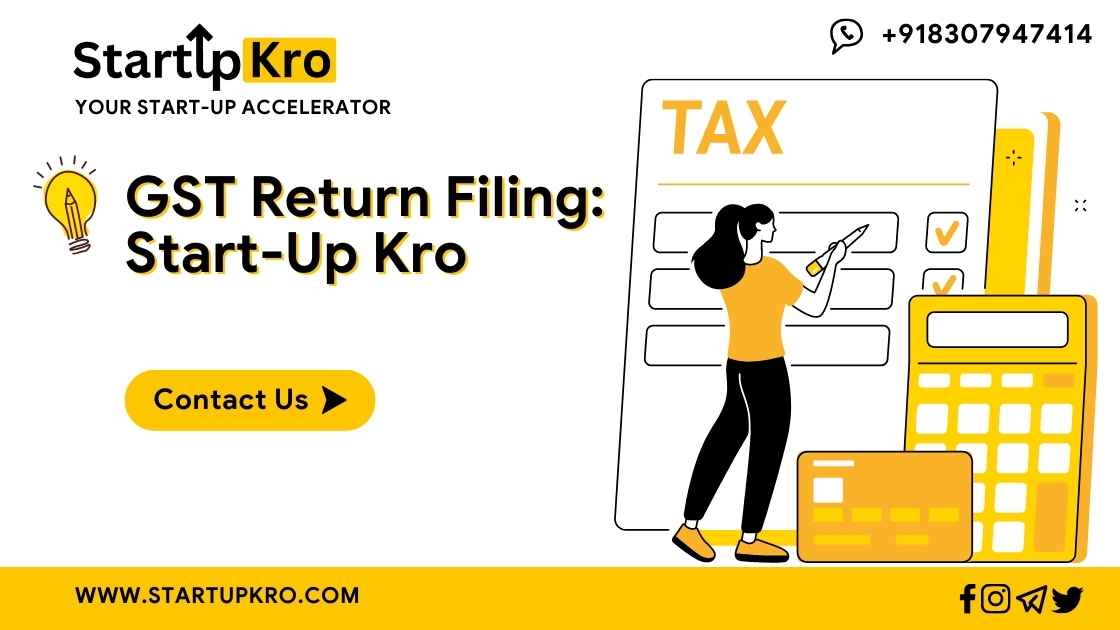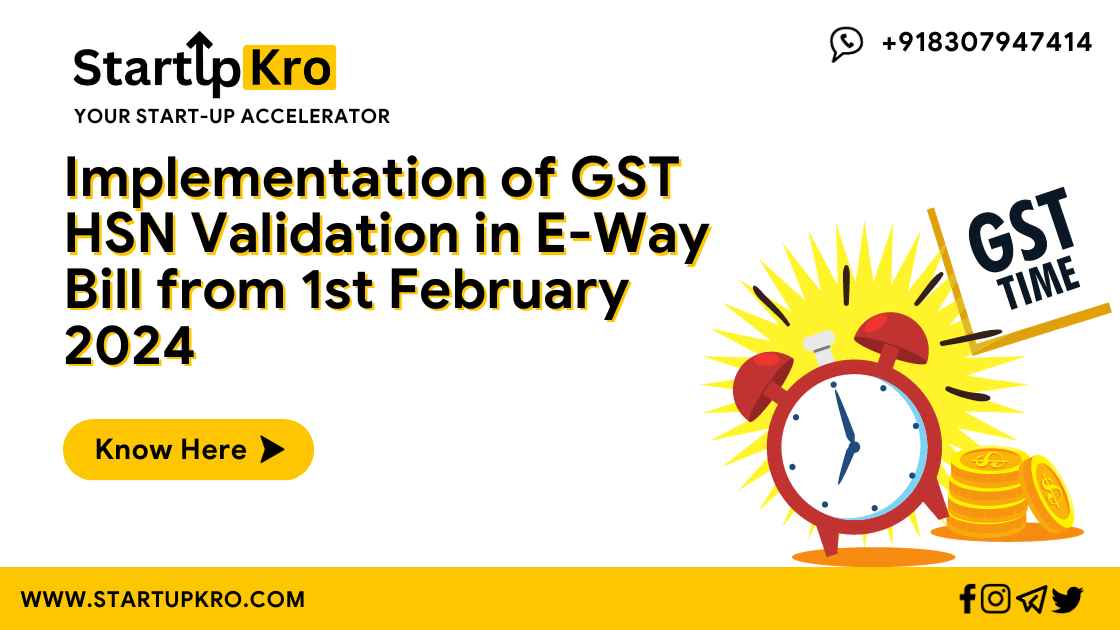

Subscribe To Our Weekly Newsletter
What is GST Return Filing?
GST return filing is a crucial requirement for businesses registered under the Goods and Services Tax (GST) system. It involves submitting the necessary details of sales, purchases, and tax collections, and payments on a monthly, quarterly, or annual basis, depending on the business. The implementation of GST in India has streamlined taxpayer services, ensuring seamless registration, accurate return filing, and compliance with the comprehensive Income Tax System.
Our Expert GST Return Filing Services
At Start-Up Kro, we specialize in providing comprehensive GST return filing services. Our experienced team understands the complexities of the GST system and is dedicated to ensuring the accurate and timely submission of returns. Whether you need assistance with monthly, quarterly, or annual return filing, we have the expertise to handle the process efficiently.
Mandatory GST Return Filing
Regardless of the business activity, sales volume, or profitability, GST return filing is mandatory for all entities with a valid GST registration in India. Even if your business is dormant, as long as you hold a valid GST registration, it is necessary to fulfil the GST return filing obligations.
Eligibility Criteria
Who should file the GST returns?
GST Return filing in India is to be done by the following:
- A person with a valid GSTIN has to compulsorily file the GST returns.
- Also, a person whose annual turnover crosses Rs. 20 lakh has to obtain a GST registration and file the GST returns mandatorily.
- In the cases of Special states, the limit for the annual turnover is Rs. 10 lakh.
Types of GST Registration
What are the different types of GST registration in India?
| GSTR 1 | Details of the outward supplies of the taxable goods and or services | Monthly Quarterly (If opted under the QRMP scheme) |
| GSTR 3B | Simple returns in which a summary of the outward supplies along with the input tax credit that is declared and the payment of the tax is affected by the taxpayer. | Monthly Quarterly |
| CMP 08 | Statement cum challan to make a tax payment by a taxpayer registered under the composition scheme under Section 10 of the CGST Act. | Quarterly |
| GSTR 4 | Returns to be filed by the taxpayer that is registered under the composition scheme under Section 10 of the CGST Act | Annually |
| GSTR 5 | Returns to be filed by a Non-resident taxable person | Monthly |
| GSTR 6 | To be filed by the input service distributor to distribute the eligible input tax credit | Monthly |
| GSTR 7 | Is filed by the government authorities | Monthly |
| GSTR 8 | Details of supplies that are affected through the e-commerce operators and the amount of tax that is collected at the source by them. | Monthly |
| GSTR 9 | Annual return for a normal taxpayer | Annually |
| GSTR 9C | Certified reconciliation statement | Annually |
| GSTR 10 | Is filed by the taxpayer whose GST registration is canceled | Is filed by the taxpayer whose GST registration is cancelled |
| GSTR 11 | Details of the inward supplies are furnished by a person who has UIN and also claims a refund. | Once the GST registration is cancelled or surrendered |
Due dates for filing the GST returns
What are the due dates for filing GST returns?
GSTR 1: The 11th of Subsequent of that month
GSTR 3B: The 20th of that subsequent month
CMP 08: 18th of the month succeeding the quarter of the specific fiscal year.
GSTR 4: 18th of the month succeeding the quarter.
GSTR 5: 20th of the subsequent month
GSTR 6: 13th of the subsequent month
GSTR 7: 10th of the subsequent month
GSTR 8: 10th of the subsequent month
GSTR 9: 31st December of the Fiscal year.
GSTR 10: Within 3 months of the date of cancellation or the date of cancellation order whichever is earlier.
GSTR 11: 28th of the month that is following the month for which the statement was filed.
Return Filing for Composition Scheme at Start-Up Kro
At Start-Up Kro, we specialize in assisting individuals registered under the Composition Scheme with their tax obligations. Under this scheme, taxpayers are required to pay taxes using CMP-08 on a quarterly basis and file GSTR-4 annually. Our streamlined process ensures that your return filing is done seamlessly through the GST Common Portal or a GST Facilitation Centre.
Composition Scheme Return Filing Deadlines For businesses enrolled under the Composition Scheme, the GST return filing deadlines are as follows:
Quarterly Filing:
The GST return for the composition scheme is due on the 18th of the month succeeding a quarter. Specifically, the deadlines fall on April 18th, July 18th, October 18th, and January 18th.
Details to Include in Composition Scheme Returns When filing GST returns under the Composition Scheme, it is important to include the following details:
- Invoice-wise Inter-State and Intra-State Inward Supplies: Provide a comprehensive record of inward supplies received from registered and unregistered persons, categorized by inter-state and intra-state transactions.
- Consolidated Details of Outward Supplies: Include an overview of the outward supplies made by your business, ensuring all relevant information is accurately documented.
Additional Filing Requirements for Composition Scheme Opted from the Beginning of a Financial Year If a registered person has chosen to pay tax under the composition scheme from the start of a financial year, there are additional filing requirements to be aware of:
Monthly GST Returns:
File monthly GST returns on the 10th, 15th, and 20th of each month, continuing until the due date for furnishing the return for September of the subsequent financial year or the furnishing of the annual return for the preceding financial year, whichever is earlier.
Ensuring Compliance with Monthly Filing Even if a taxable person under GST opts for the composition scheme from April onwards, it is important to note that monthly GST returns must be filed until September. This ensures continuous compliance with the GST regulations.
At Start-Up Kro, we have the expertise and experience to guide you through the entire process of filing GST returns under the Composition Scheme. Our dedicated team will assist you in meeting the deadlines and accurately documenting the required details, giving you peace of mind and allowing you to focus on your core business activities.
Why Choose Start-Up Kro for Filing GST Returns?
There are several reasons why Start-Up Kro is the ideal choice for your GST return filing needs:
- Timely Filing: We understand the importance of meeting deadlines. Our team ensures that your GST returns are filed within 1 to 3 working days, subject to government portal availability and timely submission of documents.
- Expertise in Composition Scheme Filing: If you are registered under the Composition Scheme, our experts will assist you in paying taxes using CMP-08 quarterly and filing GSTR-4 annually. We ensure that your returns are filed on time to avoid penalties.
- Dedicated GST Advisor: With Start-Up Kro, you get a dedicated relationship manager who specializes in your sector. They will guide you through the GST registration and filing process, assist with tasks such as invoice uploading, and ensure timely filing.
- Reminder System: Our platform provides timely reminders before the filing deadline, ensuring that you stay updated and avoid penalties. Additionally, your GST advisor will periodically remind you to ensure no deadlines are missed.
- Monthly GST Status Reports: We provide you with monthly reports detailing the status of your GST return filing, including GSTR-3B. These reports, prepared by our GST advisors, help you understand the way forward and make informed decisions.
- Input Tax Credit Reconciliation: Our services include input tax credit reconciliation, enabling your business to benefit from the government’s input tax reconciliation mechanism. This ensures neutrality in tax incidence and prevents input tax from affecting production or supply costs.
Penalties, Late Fees, and Interest Rates
At Start-Up Kro, we understand the importance of complying with the GST regulations and avoiding penalties. It is crucial to be aware of the penalties, late fees, and interest rates associated with offences committed under GST. Allow us to guide you through the process and help you stay on the right side of the law.
Late Filing Penalties
Late filing of GST returns can result in a penalty known as a late fee. As per the Goods and Services Tax guidelines, the late fee is Rs. 100 under CGST and Rs. 100 under SGST, totalling Rs. 200 per day.
In addition to the late fee, an interest rate of 18% per annum must be paid on the outstanding tax amount.
Non-Compliance Consequences
If a taxpayer fails to file GST returns, subsequent returns cannot be filed. This can lead to a cascading effect of non-compliance. To avoid hefty fines and penalties, it is strongly recommended to file GST returns on time.
Penalties for 21 Offenses (No Intention of Fraud or Tax Evasion)
For offences such as non-payment of taxes or short payments without the intention of fraud or tax evasion, an offender is liable to pay a penalty equal to 10% of the tax amount due, with a minimum penalty of Rs. 10,000.
Penalties for 21 Offenses (Intention of Fraud or Tax Evasion)
If an offender is found guilty of fraud or tax evasion, the penalty amount is determined based on the extent of tax evasion or short deduction.
Filing Nil GST Returns
Even if there is no business activity, it is mandatory for taxpayers to file Nil GST returns. This ensures compliance with the regulations and avoids any penalties associated with non-filing.
At Start-Up Kro, we prioritize your compliance and help you navigate the complexities of the GST system. Our expert team is well-versed in the penalties, late fees, and interest rates under GST. We will ensure that your returns are filed on time, minimizing the risk of penalties and allowing you to focus on your business.
Contact us today to learn more about our services and how we can assist you in maintaining compliance with GST regulations.
Find GST Filing Return Due Dates for GSTR 1 to GSTR 11
GSTR-1 (Monthly) –
11th of every month Taxpayers with a turnover of more than Rs. 1.5 crores must file monthly GSTR-1 returns by the 11th of each month.
GSTR-1 (Quarterly) –
13th of every quarter Taxpayers with a turnover of less than Rs. 1.5 crores must file quarterly GSTR-1 returns by the 13th of each quarter.
CMP-08 (Quarterly) –
Composition Scheme – 18th of every quarter Taxpayers registered under the GST composition scheme with a turnover of up to Rs. 1 crore must file CMP-08 returns by the 18th of each quarter.
GSTR-4 (Annual) –
Composition scheme – 30th April Composite taxpayers filing the annual return must file GSTR-4 by the 30th of the month following the financial year.
GSTR-9 (Annual) –
Annual returns – 31st December The annual GST return filing for all entities is due on the 31st of December.
GSTR-1 Return –
10th of every month Taxpayers with regular GST registration must file GSTR-1 or return outward supplies by the 10th of each month. Please note that the due dates for July, September, and October may differ from the normal schedule.
GSTR-2 Return –
15th of every month Taxpayers with regular GST registration must file GSTR-2 or return inward supplies by the 15th of each month. Please note that the due dates for July, September, and October may differ from the normal schedule.
GSTR-3 Return –
20th of every month After filing GSTR-1 and GSTR-2, taxpayers must file GSTR-3 or the monthly GST return by the 20th of each month. Please note that the due dates for July, September, and October may differ from the normal schedule.
GSTR-4 Return –
18th of October, January, April, and July Taxpayers registered under the GST composition scheme must file GSTR-4 on a quarterly basis, with due dates on the 18th of October, January, April, and July.
GSTR-5 Return –
20th of every month Non-resident taxable persons registered under GST must file GSTR-5 by the 20th of each month.
GSTR-6 Return –
13th of every month Input service distributors registered under GST must file GSTR-6 by the 13th of each month.
GSTR-7 Return –
10th of every month Taxpayers required to deduct tax at source (GST TDS) must file GSTR-7 by the 10th of each month. Only certain government agencies with GST TDS registration are required to file GSTR-7.
GSTR-8 Return –
10th of every month Taxpayers required to collect tax at source, such as e-commerce operators, must file GSTR-8 by the 10th of each month.
GSTR-9 Return –
31st December GSTR-9 is the annual return that must be filed by all regular taxpayers. Entities with a turnover of more than Rs. 2 crores must also have their GSTR-9 details audited. The due date for GSTR-9 is on or before the 31st of December.
GSTR-10 Return –
Within 3 months of cancellation order or surrender Any person whose GST registration has been cancelled or surrendered must file GSTR-10 within 3 months from the date of cancellation or surrender.
GSTR-11 Return –
Unique Identity Number Holders Persons with Unique Identity Numbers, such as Consulates, Embassies, and UN Bodies, must file GSTR-11 to claim refunds on inward supplies.
Staggered Return of GSTR-3B
| Turnover | Deadline for Dec 2020 | Applicable to |
|---|---|---|
| More than 5 crores | 20th of Every month | All the states and UTs |
| Less than 5 crores | 22nd of Every month for Group A States | Chhattisgarh, Madhya Pradesh, Gujarat, Daman and Diu, Dadra and Nagar Haveli, Maharashtra, Karnataka, Goa, Lakshadweep, Kerala, Tamil Nadu, Puducherry, Andaman and Nicobar Islands, Telangana and Andhra Pradesh |
| Less than 5 crores | 24th of Every month for Group B States | Jammu and Kashmir, Laddakh, Himachal Pradesh, Punjab, Chandigarh, Uttarakhand, Haryana, Delhi, Rajasthan, Uttar Pradesh, Bihar, Sikkim, Arunachal Pradesh, Nagaland, Manipur, Mizoram, Tripura, Meghalaya, Assam, West Bengal, Jharkhand and Odisha |
FAQs on GST Return Filing
Who is eligible to file GST returns?
Any registered business with a turnover of Rs 20 lakh or more must file GST returns. Businesses with a turnover of less than Rs 20 lakh can voluntarily opt for GST registration and file returns.
What is the monthly return in GST?
The monthly return in GST is the GSTR-3B form. It is used to declare the total sales and purchases made during the month. The form must be filed by the 20th of the following month to avoid late fees.
What is the difference between GSTR-3 and GSTR-3B?
GSTR-3 is a comprehensive form that requires businesses to provide detailed information about their sales and purchases. On the other hand, GSTR-3B is a simplified form that only requires basic information.
Can GST returns be revised?
No, there is no provision for revising a GST return. Any unreported invoices from the previous tax period must be included in the return for the current month, and interest may be applicable.
What is the penalty for not filing GST returns?
The GST Department tracks all non-filers of GST returns, and a list of defaulters is provided to the respective GST authorities for follow-up and enforcement action. The GST law includes the imposition of automatic late fees for non-filers and late filers.
Who should file a GSTR-1 return?
Under GST, all taxpayers, except input service distributors, non-resident taxable persons, casual taxable persons, and those paying tax under the GST composition scheme, are required to file a GSTR-1 return.
How to file a GSTR-1 return?
GSTR-1 returns can be filed online on the GST portal. Alternatively, you can use the LEDGERS GST software to file a GSTR-1 return. Create an account, update sales details for the month, and click on “Upload GST Return” to file.
What is the time limit for filing a GSTR-1 return?
The due date for filing a GSTR-1 return is usually the 10th of every month. However, for July 2017, the due date is the 10th of October. The due dates for other months are yet to be announced by the GST Council.
What information is required to be filed in GSTR-1?
In the GSTR-1 return, the taxpayer needs to provide basic details, such as GSTIN, return period, invoice-level information including B2B and B2C invoices, export invoices, a summary of documents issued, and an HSN code-wise summary of sales.
What is the meaning of details of outward supplies?
Under GST, “details of outward supplies” refers to information related to sales transactions in a month, including invoices issued, debit notes, credit notes, and revised invoices.
Can the GSTR-1 return be rectified?
Yes, any registered taxable person who has filed a GSTR-1 return can rectify it if there are any errors or omissions. The rectification can be done in the tax period when an error or omission is noticed.
What is the time limit for GST return rectification?
Taxpayers can rectify their GST returns until the month of September following the end of the financial year to which the details pertain or until the filing of the relevant annual return, whichever is earlier.
What invoices should be uploaded to the GST portal?
For B2B supplies, invoice-level details such as customer GSTIN, the item-wise value of supply, applicable tax amount, place of supply, date of invoice, and invoice number should be uploaded. For B2C supplies, invoice-level details are required when the value of supply exceeds Rs.2.5 lakhs. For supplies below Rs.2.5 lakhs, a state-wise summary of the supply statement should be filed. Invoices with a value of Rs.50,000 or more must include the buyer’s address.
How to mention HSN Code in the invoice?
Taxpayers with a turnover above Rs. 5 Crore in the preceding financial year must compulsorily mention the HSN code (4-digit) for goods and Services Accounting Codes (SAC) for services. Taxpayers with a turnover between Rs. 1.5 Crores and Rs. 5 Crores may specify HSN codes at the 2-digit chapter level as an optional exercise. From the second year of GST operations, mentioning a 2-digit chapter-level HSN code will be mandatory for this turnover range. Taxpayers can use HSN codes at the 6-digit or 8-digit level if desired. For taxpayers below the turnover limit of Rs. 1.5 Crore, the description of goods/services should be mentioned. Goods and services will be denoted by G and S, respectively.
Who should file GST returns?
Under GST, every person or entity registered under GST is required to file a GST return for the prescribed period. Even entities with a GST registration but no activity must file a Nil Return to comply with GST regulations.
How often do I have to file GST returns?
Regular taxpayers must file GSTR-1, GSTR-2, and GSTR-3 on a monthly basis. The due dates are the 10th, 15th, and 20th of each month, respectively. Compounding taxpayers file GSTR-4 every quarter. Additionally, all registered persons or entities must file an annual GST return by 31st December of the following financial year. If auditing requirements apply, the GST reconciliation statement must be certified by a Chartered Accountant.
How to file GST returns?
GST returns must be filed online. There is also an option to prepare the returns offline and upload them to an online portal.
Share:

Book an Appointment
Schedule an Appointment with our Expert here.
Social Media
Most Popular


How to Respond to Trademark Objection


